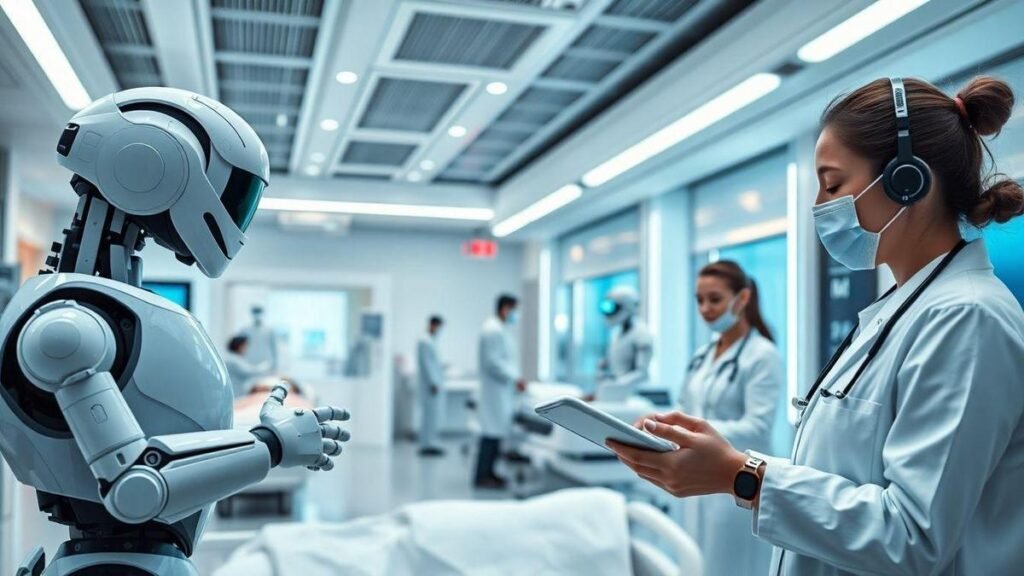
The Impactos da Inteligência Artificial no Mercado de Trabalho para Profissionais de Saúde em Hospitais is a big deal! In this article, you’ll discover how AI is shaking up the way we work in healthcare. From changing roles in hospitals to creating new job opportunities, there’s so much to explore. You’ll see how AI helps improve patient care and makes long admin tasks easier. But it’s not all smooth sailing; we’ll also look at the challenges you might face and why staying sharp with new skills is crucial as you navigate this evolving landscape. Ready to dive in? Let’s go!
Key Insights
- AI is changing how health jobs work.
- AI can help make better decisions.
- Many tasks are easier with AI assistance.
- AI helps doctors find problems faster.
- Training for AI skills can boost your career.

Understanding the Impactos da Inteligência Artificial on Health Jobs
How AI is Changing Hospital Roles
Artificial Intelligence (AI) is shaking things up in hospitals. You might be wondering how exactly this is happening. Well, it’s all about streamlining tasks and making work easier for healthcare workers. For example, AI can help doctors analyze patient data quickly, allowing for faster decisions about treatment plans. Imagine a doctor having a virtual assistant that sorts through mountains of medical records in seconds! This allows them to focus more on patient care rather than paperwork.
The Rise of Automation in Healthcare
Automation is on the rise in healthcare, and this is a game changer. Robots and AI systems are taking over repetitive tasks, including everything from scheduling appointments to managing inventory in pharmacies. So, what does this mean for you as a healthcare professional? It means you get to spend more time interacting with patients and less time on mundane tasks.
Here’s a quick look at some tasks that AI can handle:
| Task | AI Role |
|---|---|
| Patient Scheduling | Automating appointments |
| Data Analysis | Analyzing medical records |
| Inventory Management | Tracking supplies |
| Diagnostic Assistance | Helping with diagnoses |
The Need for New Skills in Health Professions
As AI becomes more common, there’s a growing need for new skills in health professions. You might need to learn how to work alongside AI tools, which could include understanding how to interpret AI-generated reports or using new software for patient management.
By harnessing the power of AI, you can improve your efficiency and patient outcomes. It’s like having a superpower! Consider seeking out training or courses that focus on AI in healthcare, as learning to integrate AI tools will not only boost your career but also make you a vital part of your team.
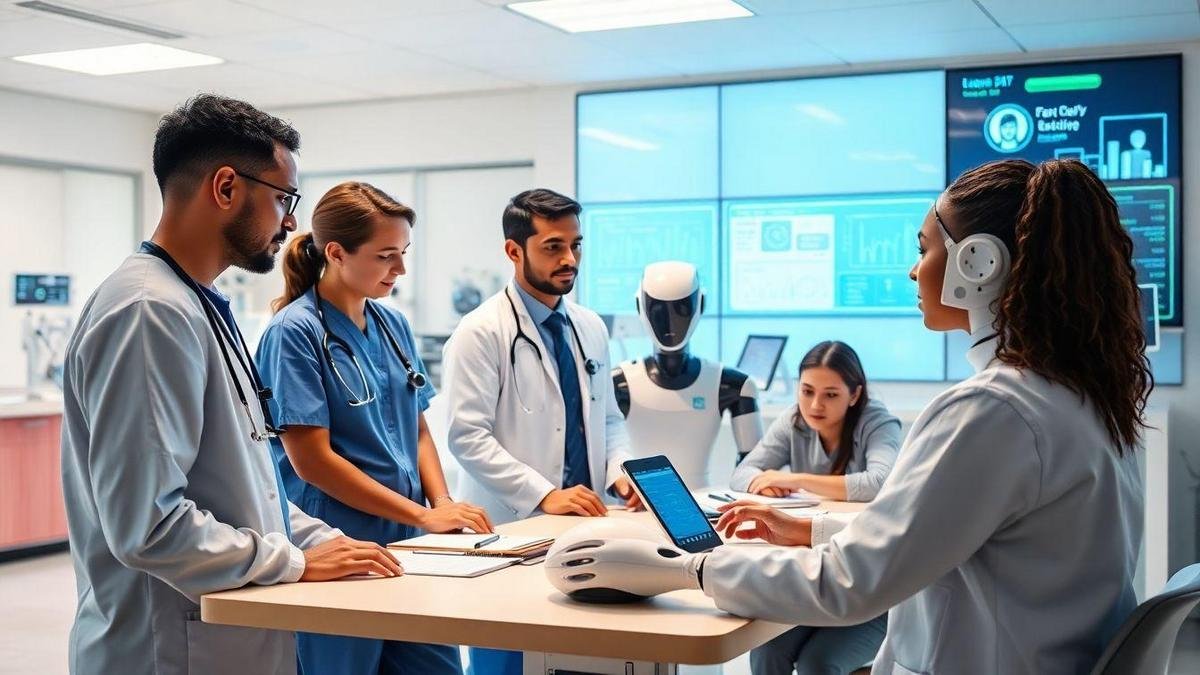
The Benefits of AI in Healthcare Employment
Improving Patient Care with AI
AI is changing the way you think about patient care. Imagine a world where doctors can quickly analyze a patient’s data and make better decisions. AI tools can help identify health issues faster than ever before. For instance, AI can look at medical images and spot problems that a human eye might miss. This means better diagnoses and faster treatments.
Streamlining Administrative Tasks
Let’s face it—paperwork can be a real headache. AI can take over many of these tedious tasks. It can schedule appointments, manage patient records, and handle billing. This not only saves time but also reduces errors. With AI doing the heavy lifting, you can focus more on what really matters—your patients.
AI’s Role in Reducing Workload for Health Workers
AI is like a helpful assistant for health workers. It can:
- Automate repetitive tasks: No more endless paperwork!
- Analyze data quickly: Get insights without spending hours on research.
- Support decision-making: Offer suggestions based on patient history.
Here’s a simple table to show how AI helps reduce the workload:
| Task | Manual Process Time | AI Process Time | Time Saved |
|---|---|---|---|
| Patient Scheduling | 30 minutes | 5 minutes | 25 minutes |
| Data Entry | 1 hour | 10 minutes | 50 minutes |
| Billing | 45 minutes | 15 minutes | 30 minutes |
With these time savings, you can spend more quality time with your patients, improving their experience and care.
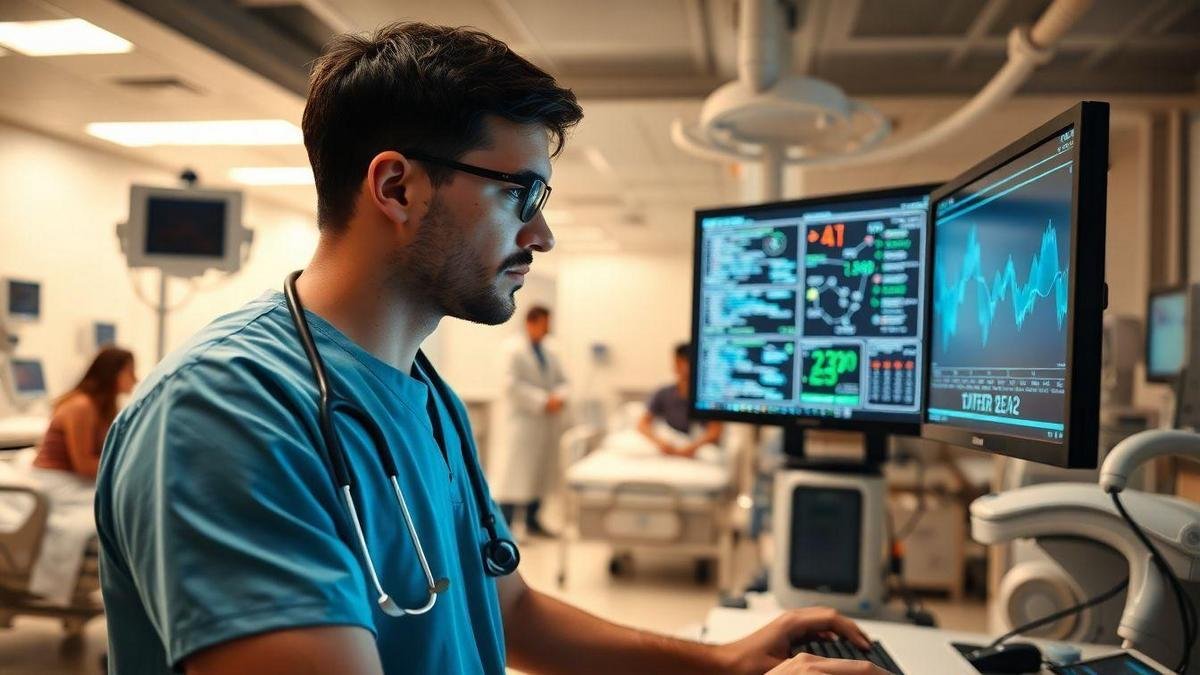
Challenges Faced by Health Professionals with AI
Job Displacement Concerns
You might be wondering how AI is changing the job landscape for health professionals. It’s a valid concern. Many fear that as AI tools become smarter, they could replace human jobs in hospitals. While AI can assist with tasks like data analysis and patient monitoring, it can’t replace the human touch that’s essential in healthcare. Patients need empathy and understanding, which machines simply can’t provide.
Adapting to New Technologies
Adapting to new technologies can feel like learning to ride a bike all over again. At first, it’s wobbly and confusing. But once you get the hang of it, it can be a game-changer. Health professionals must learn how to use AI tools effectively. This means attending training sessions and practicing with new software.
Here’s a quick look at some common AI technologies in healthcare:
| AI Technology | Use in Healthcare |
|---|---|
| Chatbots | Answer patient questions and schedule appointments |
| Predictive Analytics | Forecast patient admissions and outcomes |
| Robotic Surgery | Assist surgeons in performing precise operations |
The Importance of Continuous Learning in Healthcare
In this fast-paced world, staying updated is key. Continuous learning is crucial for health professionals. It’s like sharpening a knife; the sharper it is, the better it cuts. Regular training helps you stay ahead and provide the best care possible.
Consider joining workshops or online courses that focus on AI in healthcare. Not only will you gain new skills, but you’ll also feel more confident in your role. Remember, learning never stops, and embracing change can lead to exciting opportunities.
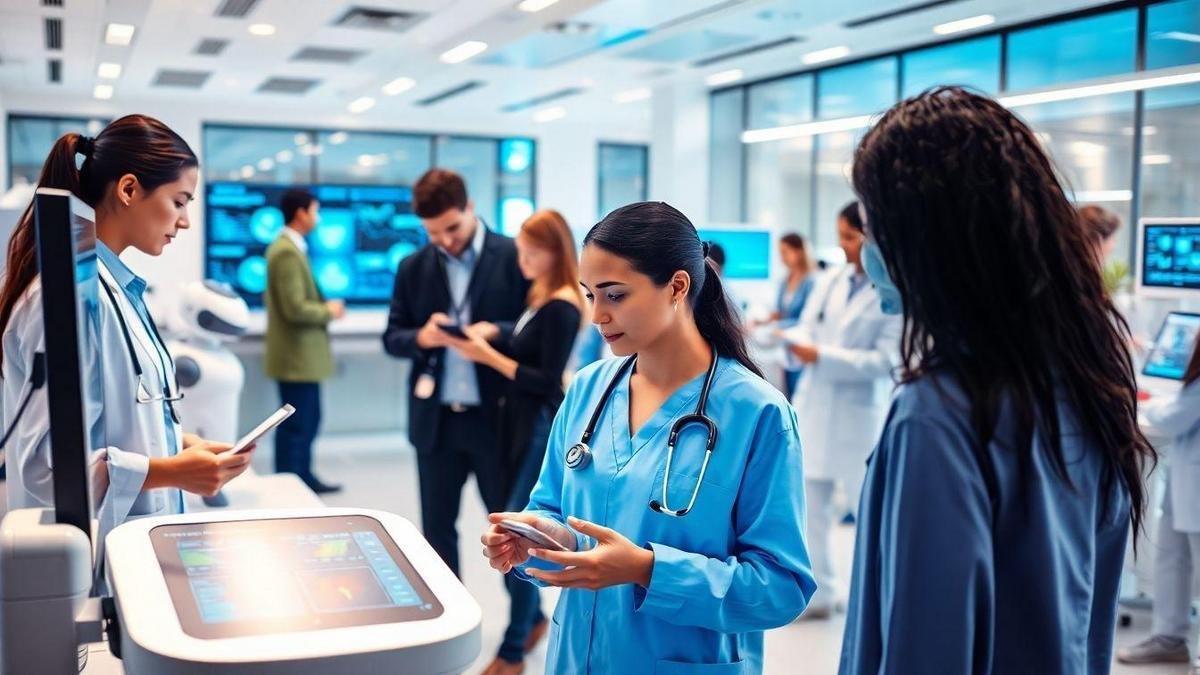
The Future of Work in Health with AI
New Job Opportunities in Digital Health
The health industry is changing fast, and AI is leading the way. You might be surprised to learn that there are many new job opportunities popping up in digital health. These roles often blend technology with healthcare, making them exciting and fresh.
Here are some examples of jobs you might find:
- Health Data Analyst: You’ll look at patient data to find trends and improve care.
- Telehealth Coordinator: This role helps set up online doctor visits, making healthcare more accessible.
- AI Health Specialist: You’ll work on AI tools that help doctors diagnose and treat patients better.
These positions are not just about tech; they are about improving patient care and making healthcare more efficient.
Evolving Roles for Healthcare Workers
If you’re already in healthcare, you might be wondering how your job will change. AI is reshaping many roles, giving you the chance to focus on what really matters—patient care.
For example:
- Nurses might spend less time on paperwork and more time with patients.
- Doctors could use AI to get quick insights into patient health, helping them make faster decisions.
- Pharmacists may use AI to track medication interactions and improve safety.
These changes can make your job more rewarding and less stressful. You can concentrate on what you love most—helping people.
How AI Shapes Career Paths in Health Professions
AI is not just changing jobs; it’s also changing how you think about your career path. Many healthcare workers are now looking for ways to upskill. You might want to learn about AI tools to stay ahead in your field.
Here’s a quick look at how AI can shape your career:
| Current Role | New Skills Needed | Future Opportunities |
|---|---|---|
| Nurse | AI Training, Data Management | Nurse Educator, AI Health Consultant |
| Physician | Digital Health Tools, Data Analysis | Telemedicine Specialist, AI Researcher |
| Medical Technician | AI Equipment Handling, Software Use | AI Health Technician, Data Analyst |
By embracing these new skills, you can open doors to exciting opportunities that didn’t exist before.

Essential Skills for Health Workers in the Age of AI
Technical Skills for Using AI Tools
In today’s fast-paced healthcare environment, technical skills are more important than ever. You might find yourself using various AI tools to improve patient care. Here are some key skills to focus on:
- Data Analysis: Knowing how to interpret data can help you make informed decisions.
- Software Proficiency: Familiarity with AI software is crucial. This means being comfortable with tools that assist in diagnostics and treatment plans.
- Basic Programming: Understanding the basics of programming can give you an edge when dealing with AI systems.
Here’s a quick table summarizing these skills:
| Skill | Importance |
|---|---|
| Data Analysis | Helps in making informed decisions |
| Software Proficiency | Essential for using AI tools effectively |
| Basic Programming | Provides an edge in understanding AI systems |
Soft Skills Needed for Patient Interaction
While technical skills are vital, soft skills play a huge role in patient care. You need to connect with patients on a personal level. Here are some soft skills to develop:
- Empathy: Understanding a patient’s feelings can make a big difference in their care.
- Communication: Clear communication helps in explaining complex medical terms.
- Teamwork: Collaborating with colleagues ensures better patient outcomes.
These soft skills can help you build trust, making patients feel comfortable and cared for.
Lifelong Learning as a Key to Success in Healthcare
The healthcare field is always changing. That’s why lifelong learning is crucial. You should always be looking for new information and skills. Here are some tips to keep learning:
- Attend Workshops: These can provide hands-on experience with new tools.
- Online Courses: Many platforms offer courses tailored to healthcare professionals.
- Networking: Connecting with other professionals can expose you to new ideas and practices.
Staying updated will not only help you in your career but will also improve the care you provide to your patients.
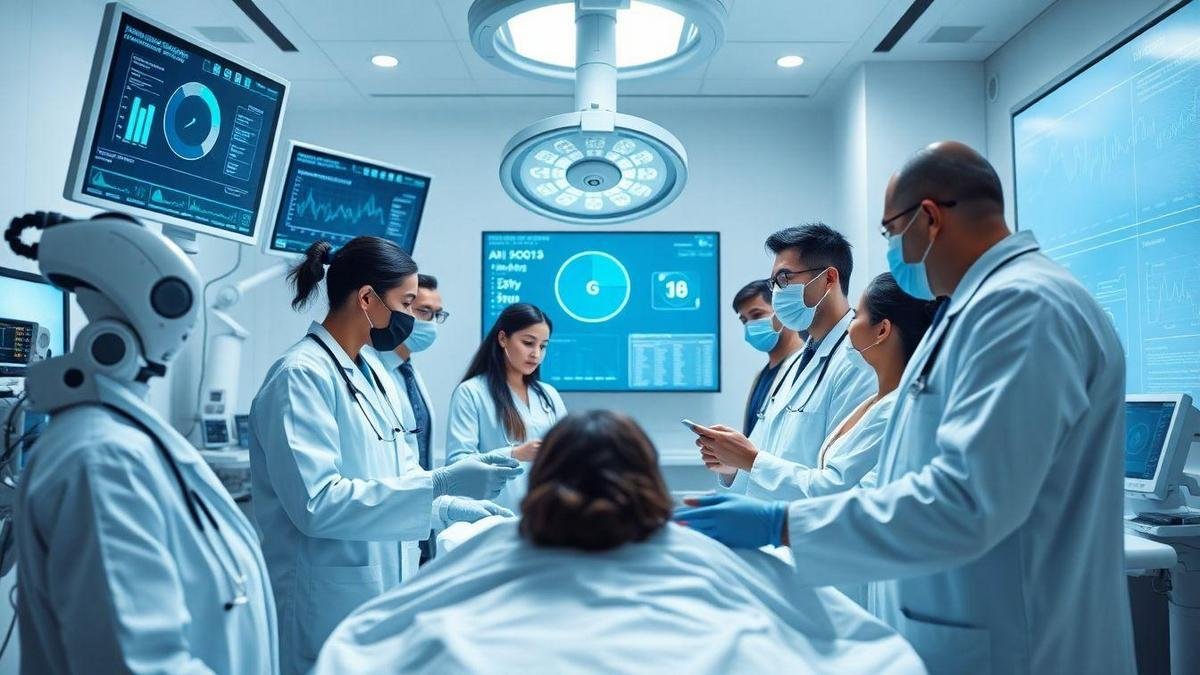
The Role of AI in Enhancing Medical Technology
Innovations in Diagnostic Tools
Artificial Intelligence is making waves in diagnostic tools. Imagine a world where machines can help doctors catch diseases earlier than ever. With AI, that’s becoming a reality. These tools can analyze medical images like X-rays and MRIs faster and often more accurately than a human. For example, AI can spot tiny tumors that might be missed by the human eye. This means quicker diagnoses, which can lead to better outcomes for patients.
Here’s a quick look at how AI is changing diagnostics:
| AI Diagnostic Tool | Benefit |
|---|---|
| Image Analysis | Faster detection of diseases |
| Predictive Analytics | Anticipating health issues |
| Symptom Checkers | Guiding patients to the right care |
AI in Treatment Planning and Management
When it comes to treatment planning, AI is like having a super-smart assistant. It can sift through mountains of data to suggest the best treatment options for patients. This means you get a plan that’s tailored just for you. For instance, AI can analyze your medical history, genetic information, and even lifestyle choices to recommend the most effective treatments.
Here’s how AI helps in treatment planning:
- Personalized Medicine: Treatments that fit your unique needs.
- Real-time Monitoring: Keeping track of your health and adjusting plans as needed.
- Resource Management: Helping hospitals use their resources more efficiently.
The Impact of AI on Medical Research and Development
AI is also shaking things up in medical research. It speeds up the process of finding new drugs and treatments. Researchers can analyze data from clinical trials much faster, which means breakthroughs can happen sooner. For example, AI can help identify which patients might benefit from a new drug based on their genetic makeup. This leads to more effective treatments and can save lives.
Here’s a snapshot of AI’s impact on research:
| Research Area | AI Application |
|---|---|
| Drug Discovery | Finding new compounds faster |
| Clinical Trials | Identifying suitable candidates |
| Data Analysis | Making sense of complex data |
Conclusion
In summary, the impact of AI on the healthcare job market is nothing short of revolutionary. As you’ve seen, AI is not just a tool; it’s a game changer that’s redefining roles, enhancing patient care, and streamlining administrative tasks. While it’s natural to have concerns about job displacement, the reality is that AI is here to assist you, not replace you. It’s like having a trusty sidekick that helps you tackle the mundane, allowing you to focus on what truly matters—your patients.
As you navigate this evolving landscape, remember that continuous learning is your best ally. Embracing new skills will not only keep you relevant but will also open doors to exciting opportunities in digital health. So, keep your eyes peeled for training and resources that can help you harness the power of AI in your daily work. For more insights, consider exploring health benefits related to AI advancements that can enhance your practice.
You’ve got the tools to thrive in this new era, so don’t hesitate to dive deeper into the world of AI and healthcare. For more insights and articles that can help you along the way, be sure to check out meqviral.com. Happy reading!
Frequently Asked Questions
How is AI changing health jobs?
AI helps speed up tasks. You will see robots handling patient data and helping doctors. This lets healthcare staff focus more on patients.
Will AI take away my job in healthcare?
Not likely! AI helps workers instead of replacing them. It takes over boring tasks, allowing you to spend more time with patients.
What skills will I need in the future?
You’ll need to learn how to work with AI tools. Also, good communication will be key. These skills will help you stand out in your job.
Are there benefits to using AI in hospitals?
Absolutely! AI can predict health issues and improve treatment plans. This means better care for you and your patients.
What are the impactos da inteligência artificial no mercado de trabalho para profissionais de saúde em hospitais?
AI impacts your work by increasing efficiency and improving patient outcomes. It’s all about making healthcare smarter!